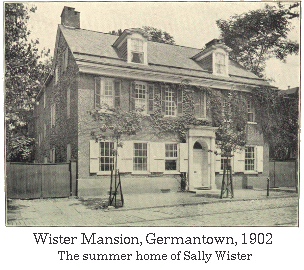
| Page: 1 2 3 4 5 6 7 8 | Previous | Next |
Sally Wister was born July 20, 1761, in an old house belonging to her grandfather Wister, at what is now 325 Market Street, Philadelphia. She had an interesting and distinguished ancestry. Her father was of pure German, and her mother of pure Welsh descent.
Her grandfather John Wister (1708 - 1789) was a Palatine, a native of the village of Hilsbach in Baden, seventeen miles southeast of Heidelberg. He was a son of Hans Caspar Wüster (1671 - 1726), of Hilsbach, Jäger in the service of the Elector Palatine; [2] In 1727, shortly after the death of his father, John Wister, then a youth of nineteen, set out for Pennsylvania to join his brother Caspar, who had emigrated ten years previously. After a voyage of four months he arrived at Philadelphia in September of that year.
He entered upon the business of a wine merchant, and in the course of a few years amassed a considerable fortune, a large part of which he invested in real estate. In 1731 he purchased the property on what is now Market Street, where he made his home for many years; and it was here that his granddaughter Sally was born.
As years went by he purchased large tracts of land in Germantown, and in 1744, on one of these, bordering on Main Street, he erected a comfortable and spacious mansion, which he used as a summer home. Ample grounds extended to the east of the house in a large tract of field and woodland, a portion of which, still owned by the Wister family, has been known for more than a century as Wister's Woods. The old mansion, which is located on Germantown Avenue near Queen Lane, has descended to a great-grandson, its present occupant, Charles J. Wister, Esquire, and is one of the cherished landmarks of Germantown.

John Wister [3] married, as his second wife, Anna Catharine Rubenkam (1709 - 1770), a native of the city of Wanfried in Hesse-Cassel, Germany, daughter of John Philip Rubenkam, a clergyman of that city. By her he had one son, Daniel Wister (1738-9 - 1805), who was married by Friends' ceremony, May 5, 1760, to Lowry Jones, of Philadelphia.
Lowry Jones was descended from the Welsh planters of Merion and Gwynedd, in means, education, and character among the very best of the early settlers of Pennsylvania. Her father was Owen Jones (1711 - 1793), of Lower Merion and Philadelphia, at one time Provincial Treasurer of Pennsylvania. Owen Jones was a son of Jonathan Jones (1680 - 1770), a native of Bala, in Merionethshire, Wales, and a grandson of Dr. Edward Jones (c. 1645 - 1737), of Bala, Merionethshire, who was the leader of the band of Welsh settlers who came over in 1682 to settle in the Welsh Barony. The wife of Dr. Edward Jones was Mary, daughter of Dr. Thomas Wynn (c. 1630 - 1692), of Caerwys, Flintshire, Wales, an early Quaker pamphleteer, and a passenger on the Welcome with William Penn in 1682.
Lowry Jones's grandmother, Gainor, wife of Jonathan Jones, was a daughter of Robert Owen (c. 1657 - 1697), of Fron Goch, Merionethshire, an emigrant to Pennsylvania in 1690, and a descendant of a twelfth century chieftain, Rhirid Flaidd, Lord of Penllyn, and of Edward I. of England. Robert Owen's wife, Rebecca Humphrey, was herself a descendant of Edward III. of England.
The mother of Lowry Jones, Susanna (1719 - 1801), wife of Owen Jones, was a daughter of Hugh Evans (1682 - 1772), by his wife Lowry Williams (1680 - 1762), and a granddaughter of Rees John Williams, an emigrant from Merionethshire in 1684. The wife of Rees John Williams was Hannah Price (1656 - 1741), daughter of Richard ap Griffith ap Rhys, a descendant of Owen Glendower Tudor, and of Edward I., King of England.[4] Hugh Evans was a son of Thomas Evans (1651 - 1738), of Gwynedd, in Pennsylvania, an emigrant from Wales in 1698, by his wife Ann, and a grandson of Evan ap Evan, who was a descendant of Owen, Prince of Gwynedd, and of Bleddyn, Prince of Wales.[5]
Sally Wister was thus a type of the new composite race that had sprung up in Pennsylvania. In her veins was mingled the best blood of two great peoples, and doubtless it was to this blending of Teutonic warmth and earnestness with Cymric sensibility to poesy and romance that we owe much of the charm and sprightliness of her Journal.
Previous page | Next page